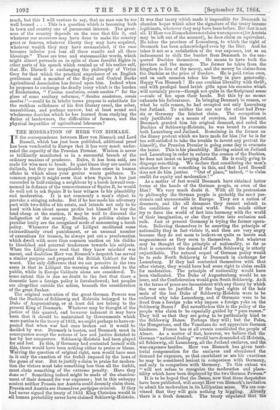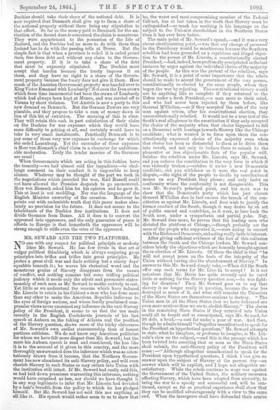THE MODERATION OF HERR VON BISMARK. TN the correspondence between
Herr von Bismark and Lord 1 Russell, which has just been published, additional proof has been vouchsafed to Europe that it has very much under- rated the capacity of the Prussian Premier. Wisdom is never so brilliantly manifested as in a successful breach of the ordinary maxims of prudence. Rules, it has been said, are made for wise men to break. In quiet times they are useful to dullards, but they are inapplicable to those crises in human affairs in which alone your genius wants guidance. To common people it might seem that when Squire A has just succeeded in half-ruining a neighbour by a harsh lawsuit com- menced in defiance of the remonstrances of Squire B, he would do well not to ask Squire B to bear witness to his placability and moderation. It is not commonly a man's object to provoke a stinging rebuke. But if he has made his adversary part with two-fifths of his estate, and intends not only to be hard with him about mesne profits but himself to buy the land cheap at the auction, it may be well to discount the indignation of the county. Besides, in politics claims to peculiar lenity are the recognized mode of announcing a harsh policy. Whenever the King of Lilliput meditated some extraordinarily cruel punishment, or an unusual number of executions for treason, he always put out a proclamation which dwelt with more than common unction on his dislike to bloodshed and paternal tenderness towards his subjects. When the Lilliputians read that they knew mischief was meant, and doubtless Herr von Bismark's despatch has served a similar purpose and prepared the British Cabinet for the worst. The only difference that we can perceive in the two eases is that is Lilliput the warning was addressed to the public, while in Europe Cabinets alone are considered. To some extent this is due no doubt to the fact that there a domestic here a foreign policy is foreshadowed; but peoples are altogether outside the action, beneath the consideration of the great Sunken The original contention of the great German Powers was that the Duchies of Schleswig and Holstein belonged to the Duke of Augustenburg, or at least did not belong to the present King of Denmark. Whatever may be thought of the justice of this quarrel, and however indecent it may have been that it should be maintained by Governments which were parties to the treaty of 1852, we ought perhaps to have ex- pected that when war had once broken out it would be decided by war. Denmark is beaten, and Denmark must in consequence accept the notions of law and justice dictated to her by her conquerors. Schleswig-Holstein had been played for and lost. In this, if Germany had contented herself with this, there would have been nothing either to praise or blame. Waiving the question of original right, men would have seen in it only the exaction of the forfeit imposed by the laws of the game of war. But to justify a claim to praise for modera- tion the victors must take something less than all the forfeit, must abate something of the extreme penalty. Have they done so? Something indeed might be made of the abandon- ment of their demand for war expenses ; but in this unhappy contest neither Prussia nor Austria could decently claim them. Prussia and Austria are themselves participes criminis. If they had never signed the treaty of 1852 ring Christian would in all human probability never have claimed Schleswig-Holstein. It was that treaty which made it impossible for Denmark to abandon hopes which after the signature of the treaty became legitimate, whatever they may have been before. But that is not all. If Herr von B ismarkdoes not claim war expen ses (for Austria may be left out of the account), he does claim an equivalent.. He takes the province of Lauenburg, to which the right of Denmark has been acknowledged even by the Diet. And he takes it not as a satisfaction of the war expenses, but as an inducement to shift the burden from Denmark to the con- quered Duchies themselves. He means to have both the- province and the money. The former he takes from the kingdom in lieu of the money, and the money he claims from. the Duchies as the price of freedom. He is paid twice over, and on each occasion takes his booty in pure generosity.. Happy Von Bismark ! He can combine liberality with thrift,. and with prodigal hand lavish gifts upon his enemies which will certainly prove—though not quite in the Scriptural sense —coals of fire upon their heads. But this by no means exhausts his forbearance. In bringing Denmark to reason, or what he calls reason, he had occupied not only Lauenburg but Jutland. To neither the one nor the other had Prus- sia or Germany the faintest claim. The occupation is only justifiable as a means of coercion, and the moment. Denmark granted him his original demand, and ceded the Duchies of Schleswig-Holstein, he was bound to evacuate both Lauenburg and Jutland. Remaining in the former on the flimsy pretext which we have made for him (for he is far too self-satisfied to take the trouble to invent any pretext for himself), the Prussian Premier is going some day to evacuate the latter. This is his placability. Having seized on Jutland and Lauenburg in order to enforce the cession of the Duchies, he does not insist on keeping Jutland. He is really going to disgorge something. We declare that considering the man's. character there is something in this, and that Lord Russell does not do him justice. " Out of place," indeed, " to claim credit for equity and moderation. ! " As a matter of fact would Denmark have obtained better terms at the hands of the German people, or even of the Diet? We very much doubt it. With all its pretensions to philosophy the German people is probably the most pas- sionate and unreasonable in Europe. They are a nation of dreamers, and like all dreamers they cannot submit to the conditions of the actual world. Such minds either try to force the world of fact into harmony with the world of their imagination, or else they retire into seclusion and sulk. Just at present Germany is trying the former opera- tion. Believing themselves to be asserting the principle of nationality they in fact violate it, and then are very angry because they do not seem to lookers-on quite as heroic and magnanimous as they seem to themselves. But whatever may be thought of the principle of nationality, so far as that is concerned the demand of North Schleswig is utterly unjustifiable. The natural sequel of German policy would. be to cede North Schleswig to Denmark in exchange for Lauenburg. If they had contented themselves with that after victory, they would have had some right to claim credit for moderation. The principle of nationality would have been vindicated. The Duke of Augustenburg would be no- loser, and the Confederation would gain South Schleswig. As it is the terms of peace are inconsistent with any theory by which the war can be justified. If the legal rights of the heir male of the last Duke of Schleswig-Holstein were to be enforced why take Lauenburg, and if Germans were to be freed from a foreign yoke why impose a foreign yoke on the Schleswig Danes ? But nevertheless this is the policy of the people who claim to be especially guided by " pure reason." They tell us that they are going to be particularly kind to the Schleswig Danes. Perhaps they will ; but the Poles, the Hungarians, and the Venetians do not appreciate German. kindness. France has at all events conciliated the people of Alsace. As a matter of fact, however, we believe that the German "national feeling" would have demanded all Holstein, all Schleswig, all Lauenburg, all the Jutland enclaves, and the . war-expenses besides. Herr von Bismark has given terri- torial compensation for the enclaves and abandoned the demand for expenses, so that exorbitant as are his exactions he may be considered lenient in comparison with Germany, and only in comparison with Germany. To this extent we " will not refuse to recognize the moderation and placa- bility which have been displayed by the two German Powers.'' It is to be hoped that the Danes, now that these despatches have been published, will accept Herr von Bismark's invitation to admit his moderation in its Lilliputian sense. We are con- vinced that they will gain nothing by higgling. Already there is a fresh demand The treaty stipulated that the Duchies should take their share of the national debt. It is now required that Denmark shall give up to them a share of the national property without there being any stipulation to that effect. So far as the money paid to Denmark for the ex- tinction of the Sound dues is concerned the claim is monstrous. They were appurtenant to the possession of the Isle of Zealand, and the Duchies had no more to do with them than Ireland has to do with the passing tolls at Dover. But the simple fact is that when a province is ceded it is ceded prim! facie, free from debt and without any claim to the Govern- ment property. If it is to take a share of the debt that must be expressly stipulated. The Duchies must accept that burden because the treaty imposes it on them, and they have no right to a share of the Govern- ment property because the treaty does not give it them. How much of the Austrian Government property was handed over to King Victor Emanuel with Lombardy? Not even the Iron crown which from time immemorial had been the crown of Lombardy which had always been kept at Monza, and was carried off to Vienna by sheer violence. Yet Austria is now a party to this new demand on Denmark. Bat the German Powers are very placable, and they propose to take a sum of money down in lieu of this bit of extortion. The meaning of this is clear. They will retain this cash in part satisfaction of their claim on the Duchies for war expenses which they would have some difficulty in getting at all, and certainly would have to take in very small instalments. Practically Denmark is to pay some of those very war expenses in exchange for which she ceded Lauenburg. Yet the surrender of those expenses is Herr von Bismark's chief claim to a character for unfathom- able moderation. Truly the tender mercies of the Germans are cruel!
When Governments which are acting in this fashion have the temerity—we had almost said the impudence—to chal- lenge comment on their conduct it is impossible to keep silence. Whatever may be thought of the part we took in the negotiations which preceded the war, Earl Russell could not have allowed the Prussian despatch to go unanswered. Herr von Bismark asked him for his opinion and he gave it. This at least is not meddling. Nor was the language of the English Minister unworthy of the occasion. Moreover he points out with undeniable truth that this peace makes abso- lutely no provision for the future. It does not secure to the inhabitants of the Duchies free institutions. It does not divide Germans from Danes. All it does is to convert the oppressed into oppressors, and the only guarantee of peace it affords to Europe is that henceforth the oppressors will be strong enough to stifle even the cries of the oppressed.































 Previous page
Previous page